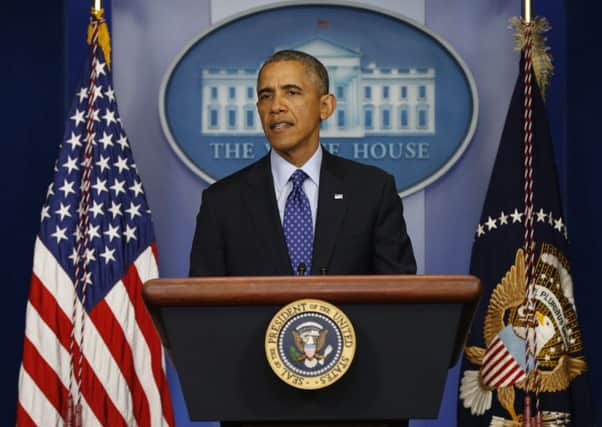US sends 300 ‘military advisers’ to help Iraq


The US president said the personnel would be deployed to train and advise Iraqi government forces – but he insisted American troops would “not be returning to combat in Iraq”.
In an address from the White House, Mr Obama responded to the rising threat from extremist, al-Qaeda-inspired militant group the Islamic State in Iraq and the Levant (Isis).
Advertisement
Hide AdAdvertisement
Hide AdOutlining a series of military support measures, the president said the US would be forming joint operation centres in Baghdad and northern Iraq to share intelligence and co-ordinate planning to confront the rebel threat.
Intelligence services will be “significantly” increased to build up a better picture of what is happening on the ground, said Mr Obama. “We will be prepared to take targeted and precise military action if and when we determine that the situation on the ground requires. If we do, I will consult closely with congress and leaders in Iraq,” said the president, raising the prospect of precision air strikes.
Mr Obama did not call for Iraqi prime minister Nouri al-Maliki to resign, despite senior US politicians demanding that the leader, a Shia Muslim who has pursued sectarian policies, should step down. Mr Obama said it was not the job of the US to choose Iraq’s leaders.
But he added that whoever is prime minister must make sure all sectarian groups feel they can advance their interests through the political process. The president emphasised that, in the long run, it was up to the Iraqi authorities to solve the crisis engulfing their country, insisting there was “no military solution”.
It was also announced that US secretary of state John Kerry is being sent to the Middle East and Europe to push a “diplomatic effort” to deal with the crisis.
“Just as all Iraq’s neighbours must respect Iraq’s territorial integrity, all of Iraq’s neighbours have a vital interest in ensuring that Iraq does not descend into civil war or become a safe haven for terrorists,” Mr Obama added.
“Above all, Iraqi leaders must rise above their differences and come together around a political plan for Iraq’s future.”
The president was adamant that US troops would not be returning to combat in Iraq.
Advertisement
Hide AdAdvertisement
Hide AdAsked if the measures announced last night could lead to an escalation of military action, he replied: “We always have to guard against mission creep. American combat troops are not going to be fighting in Iraq again. We do not have the ability to simply solve this problem by sending in tens of thousands of troops and committing the kinds of blood and treasure that has already been expended in Iraq. Ultimately, this is something that is going to have to be solved by Iraqis.”
Mr Obama made his statement the day after Mr al-Maliki, who has long faced criticism for not making his government more inclusive, went on a diplomatic offensive, reaching out in a televised address to try to regain support from the nation’s disaffected Sunnis and Kurds. His conciliatory words, coupled with a vow to teach the militants a “lesson”, came as almost all of Iraq’s main communities have been drawn into violence not seen since the dark days of sectarian killings nearly a decade ago.
The US withdrew the last American troops from Iraq in late 2011 after more than eight years of war. The withdrawal came after Washington and Baghdad were unable to reach an agreement to extend the US troop presence.
But faced with a growing Sunni insurgency, Iraq’s government has asked the US to launch airstrikes to contain Isis, which fought in the brutal Syrian civil war and has gone on to seize Mosul, Tikrit and other towns in Iraq. Isis has also launched an assault on Iraq’s biggest oil refinery in Baiji, north of Baghdad.
Last night, as fears grew that Britons had been radicalised in Iraq and Syria, Prime Minister David Cameron insisted “everything that can be done is being done” to tackle the threat. Reports have suggested 450 people from Britain have joined the ranks of the extremist Islamist militant group and concerns have been raised that they could come back and attack the UK.
Speaking in Downing Street after talks with Nato secretary-general Anders Fogh Rasmussen, the Prime Minister said: “The work of the security intelligence and policing services is very much now being focused on to this area and has been for sometime, and I’ve chaired meetings in Whitehall to make sure every department is involved in that and everything that can be done is being done.”
He added: “We will continue to take all and every step we can to stop people travelling to Syria, to prevent them coming back if they have been radicalised and to keep the country safe.”
Yesterday, former Lib Dem leader Sir Menzies Campbell emphasised the seriousness of the situation. The North East Fife MP said: “No-one should be in any doubt that the threat from radicalised British citizens who have gone to Syria to support the terrorists there and in Iraq is real.”
Advertisement
Hide Ad